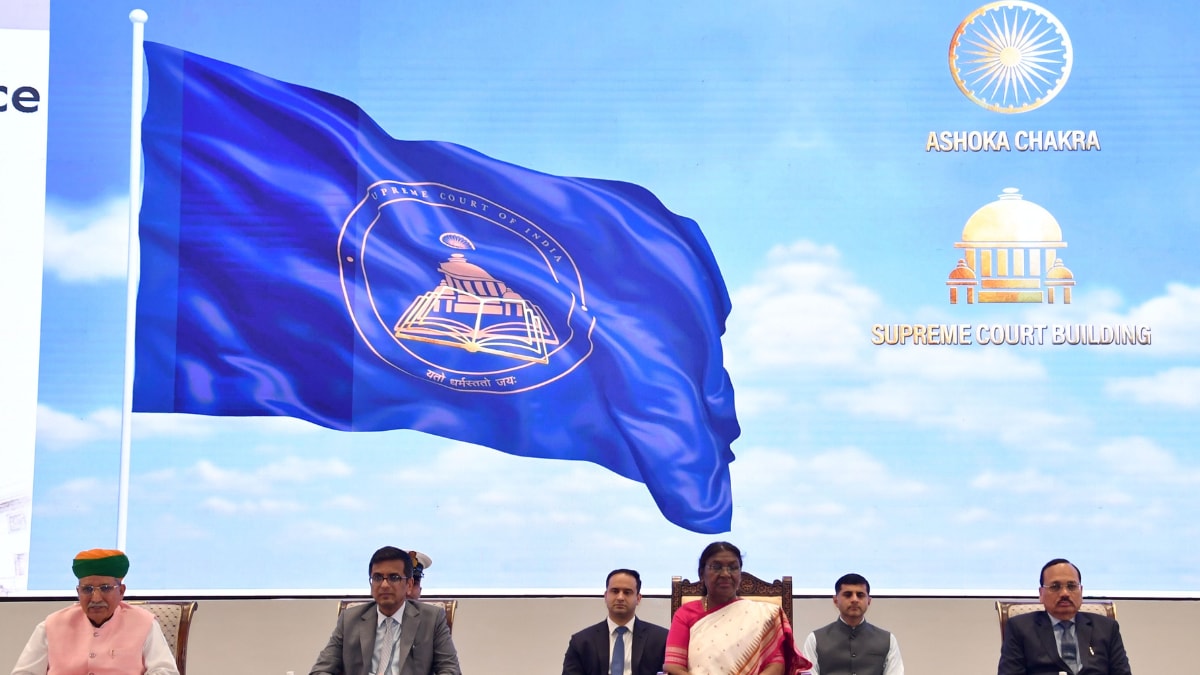The Supreme Court of India, the guardian of the nation’s constitution and the upholder of justice, celebrated its 75th anniversary on Sunday, September 10, 2023, with the unveiling of a new flag and insignia. The occasion was marked by a two-day National Conference of District Judiciary, culminating in a valedictory session addressed by the President of India, Droupadi Murmu. The President highlighted the significant role of the Supreme Court in shaping the nation’s legal landscape, its unwavering commitment to upholding justice, and its tireless efforts in ensuring access to justice for all.
The Supreme Court: A Sentinel of Justice
The President eloquently described the Supreme Court as “a vigilant sentinel of the judicial system of the world’s largest democracy,” emphasizing the institution’s crucial role in safeguarding the rule of law and ensuring justice for all. She acknowledged that the Supreme Court has earned a place of respect and admiration in the global legal community due to its robust jurisprudence and its unwavering dedication to upholding the principles of fairness and equality.
A Legacy of Trust and Attachment
President Murmu lauded the Supreme Court for its initiatives in celebrating its 75th anniversary, highlighting how these programs have fostered greater trust and attachment among citizens towards the judicial system. She recognized the profound impact that the Supreme Court has had on the lives of millions of Indians, making it an institution that commands deep respect and admiration.
The Role of District Courts in Delivering Justice
The President’s address underscored the vital role of district courts in ensuring accessible and equitable justice for the nation’s citizens. She emphasized that district courts are the first point of contact for the majority of citizens seeking legal redress, making them the face of the judiciary at the grassroots level.
A Moral Responsibility to Uphold Justice
President Murmu eloquently stressed the moral responsibility of all judges and judicial officers to uphold dharma, truth, and justice. She emphasized the critical role they play in shaping the image of the judiciary in the minds of the people, underscoring the importance of their conduct and their commitment to fairness. She said, “People consider every judge in the country as God, and every judge and judicial officer of the country has the moral responsibility to respect dharma, truth, and justice.”
Tackling the Challenges: Pendency and Backlogs
The President acknowledged the significant challenges faced by the Indian judiciary, particularly the problem of pendency and backlogs of cases. She recognized the disheartening reality of cases remaining unresolved for years, even decades, hindering access to justice for countless individuals.
A Multi-faceted Approach to Address Challenges
President Murmu highlighted the need for innovative and effective solutions to address the issue of pendency. She urged the judiciary to adopt a multi-pronged approach, including more frequent special Lok Adalat weeks, to expedite the resolution of pending cases.
Ensuring Justice for All: Accessibility and Language
Recognizing the importance of ensuring access to justice for all, the President emphasized the need to make the judicial system more accessible to marginalized communities, particularly those who lack access to legal resources. She underscored the need to provide justice in local languages and to take steps to ensure that the judicial system is responsive to the specific needs of different communities.
Bringing Justice to Every Door Step
President Murmu reiterated the importance of bringing justice to everyone’s doorstep, emphasizing the need to remove barriers to access, including language and cultural differences. She stressed the need for a justice system that is responsive to the needs of the people it serves.
Strengthening Partnerships for Effective Justice
Recognizing the need for collaboration and synergy across various branches of the government, President Murmu emphasized the importance of joint efforts between the judiciary, the government, and the police administration in tackling challenges related to evidence collection and witness protection.
Harnessing New Technologies to Improve Efficiency
The President also acknowledged the potential of new technologies to improve the efficiency and effectiveness of the judiciary, calling for the embrace of technology to ensure a more robust and responsive legal system.
A New Era of Justice: Embracing Change and Progress
The President expressed confidence that the judiciary, through its unwavering commitment to justice, will continue to evolve and adapt to the changing needs of the nation. She emphasized that the new criminal justice laws being implemented will usher in a new era of justice, ensuring a fairer and more efficient legal system.
Take Away Points
- The Supreme Court’s 75th anniversary is a momentous occasion, celebrating its legacy as a vigilant guardian of justice in India.
- The President highlighted the essential role of district courts in ensuring access to justice for all citizens.
- Addressing the challenges of pendency and backlogs remains a crucial priority for the judiciary, requiring innovative solutions and collaborations.
- The judiciary has a crucial role to play in ensuring access to justice for marginalized communities, including making the system accessible to those who speak different languages and face cultural barriers.
- New technologies can be harnessed to improve the efficiency and effectiveness of the legal system, enabling the judiciary to adapt to evolving needs and address complex challenges.
- Through the implementation of new criminal justice laws and continued commitment to upholding justice, the judiciary is poised to usher in a new era of fairness and efficiency, ensuring access to justice for all.




